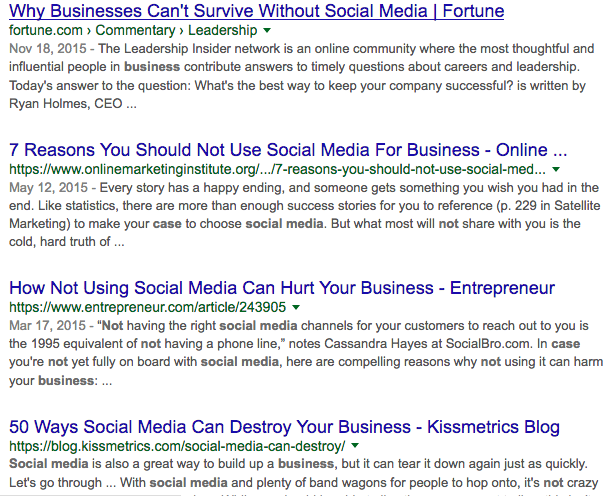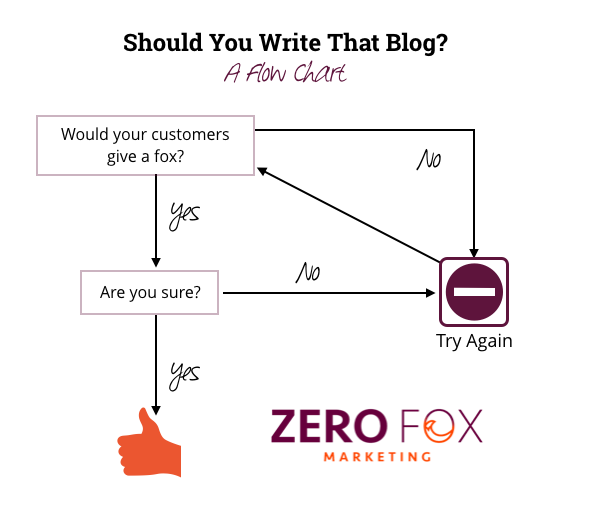I’ve talked to a lot of business owners about marketing over the last few years, and hands down, the question I get most often goes something like this:
What should I be doing on social media?
It’s a loaded question. And even worse, it’s a question with no easy answer.
Case in point: I was doing some research for a client the other day, and a Google search yielded the following four headlines, in this order.

Wow. So comforting.
No wonder it’s such a confusing topic for most business owners.
What I cannot tell you in this post is exactly what your business should do on social media. It’s an overdone topic, and a lot of what you read online about it won’t matter anyway. The best answer will be extremely nuanced based on your industry, your customer profile, what your’e selling, and what you’re trying to accomplish.
What I can tell you is this: to achieve real marketing success, frame your thinking about social media less in terms of what you should be doing in everyone else’s eyes, and more in terms of available resources and where they’re BEST spent for YOUR business. In other words:
Marketing resources (time and budget) are finite. Whatever you put into social media ultimately comes at the expense of something else. If that something else has more ROI, you are leaving money on the table.
Here’s an exercise.
Picture your marketing resources as marbles. Now imagine that all the marketing disciplines (social media, email, SEO, advertising, mailers, etc.) are buckets.
You have a choice of where to put your marbles.
If you put more into the social media bucket, you’ll have less to distribute among the others. In other words, if you spend your time and money on social media, some other marketing tactic will suffer unless you make additional marketing investments.
And even if you invest more, putting it toward social media may or may not be the best choice. Perhaps doing more of something else would lead to better results altogether.
When Social Media Marketing is a Requirement
Some businesses have less of a choice about resource allocation when it comes to social media marketing than others.
For example, if you’re in the hospitality industry, reputation management is critical and resource intensive. You will need to spend time and resources this area, i.e. on local review sites like Yelp. Your customers are going to talk about you there on a frequent basis whether you like it or not, and you need to engage accordingly to manage risk.
Some businesses have a little more leeway. For example, a niche B2B company should be aware of what people are saying about it online and respond accordingly, but feedback generally happens much less frequently and requires less ongoing maintenance.
It May be a Requirement, But You Still Have Some Free Will
Even in the different scenarios explained above, all businesses still have some choice about how much time and money to invest in social media. Some areas include:
- Post frequency
- Number of platforms
- Paid ad spend
- Graphic assets (i.e. covers and profile photos)
- Community engagement (i.e. Twitter conversations or private Facebook groups)
You can spend a lot or a little in these areas, but they may or may not make a difference to your bottom line.
Social Media Marketing Measurement
The first step to clarity is understanding your Analytics. If you’ve got conversion tracking set up properly, making those decisions should be easier.
- Cost per lead/sale. The most cut and dry situation is if you’ve got sales actions on your site (i.e. eCommerce purchases, a Quote Request Form, or a Contact Us page). In that case, you can pretty accurately calculate cost per lead or sale to understand ROI from each marketing channel. You can also see Assisted Conversion data to find out whether social media is encouraging leads/sales over time. This will allow you to test and invest more where return is highest.
- Buying signal measurement. If your sales come from something less trackable via Analytics (i.e. foot traffic to a brick and mortar location), you can still associate results with data. For example, do people that come to your website from Facebook look at your hours and offerings more or less frequently than those that come from Google AdWords? If one performs better than the other, it probably deserves more time and resources.
- Tying engagement to customer value. If you’re using social media to keep in touch with current customers (i.e. in a Facebook group, or on Twitter or LinkedIn), what value does that have to your business? Do customers that engage on social media have high lifetime value? Do they generate referrals?
Results like this may be even harder to track, but keeping them in the front of your mind will prevent you from going on autopilot in your marketing efforts.
 When it Comes to Social Media, Use Your Fox Wisely
When it Comes to Social Media, Use Your Fox Wisely
Candidly, social media marketing is a tough subject, mostly because it can be so confusing and risky for business owners. But if you spend your time and resources wisely, use the right tools for measurement, and seek counsel when you need it, you’ll be on a better path to marketing ROI.




About The Author: Christina Ousouljoglou
I'm a results-focused, data driven go-getter. I help clients turn marketing headaches into understandable business strategies that work.
More posts by Christina Ousouljoglou